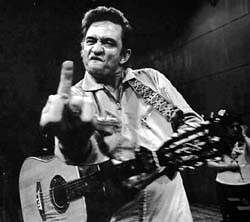Monday Morning News:

WASHINGTON – Vice President Cheney accidentally sprayed a companion with birdshot while hunting quail on a private Texas ranch, injuring the man in the face and chest, the vice president’s office confirmed Sunday after a Texas newspaper reported the incident.
The shooting occurred late Saturday afternoon while Cheney was hunting with Harry Whittington, 78, a prominent Austin, Texas, lawyer, on the Armstrong Ranch in south Texas.
Hearing a covey of birds, Cheney shot at one, not realizing that it was Whittington who had startled the quail and that he was in the line of fire. Whittington was treated on the scene by Cheney’s traveling medical detail before being taken by helicopter to a Corpus Christi hospital. He was in the intensive care unit at Christus Spohn Health System and listed in stable condition Sunday evening.
Katharine Armstrong, the ranch’s owner, saw what happened and told reporters Sunday that Cheney was using a 28-gauge shotgun, which shoots lighter pellets than a 12-gauge shotgun and is common among bird hunters. Whittington was about 30 yards away when he was hit in the cheek, neck and chest, she said.
According to Armstrong’s account, she was watching from a car while Cheney, Whittington and another hunter got out of the vehicle to shoot at a covey of quail. Whittington shot a bird and as he went to retrieve it, Cheney and the third hunter discovered a second covey.
Cheney’s office made no public announcement, deciding to defer to Armstrong because the accident had taken place on her property. Armstrong called the Corpus Christi Caller-Times, and when a reporter from the paper called the White House, the vice president’s office confirmed the account.
Armstrong told reporters that the small shotgun pellets “broke the skin” and that the blast “knocked him silly. But he was fine. He was talking. His eyes were open. It didn’t get in his eyes or anything like that,” she said.
“Fortunately, the vice president has got a lot of medical people around him and so they were right there and probably more cautious than we would have been,” she said. “The vice president has got an ambulance on call, so the ambulance came.”
The International Hunter Education Association, which represents safety coordinators for fish and wildlife agencies and tracks reports by state, said on its Web site that hunting accidents in the United States have declined about 30 percent over the past decade. In 2002, the most recent year data were available, 89 fatal and 761 non-fatal accidents were reported. In 26 of the cases, including one fatality, the intended target was quail.
“The vice president visited Harry Whittington at the hospital and was pleased to see that he’s doing fine and in good spirits,” Cheney spokeswoman Lea Anne McBride said Sunday. The vice president returned to Washington on Sunday night.
“The president was informed after the accident and received updates today,” White House press secretary Scott McClellan said Sunday.
Whittington is well-known around Austin. Feisty and outspoken, he is a millionaire real estate investor who is known for a reformer’s streak through his service on the Texas Board of Criminal Justice, which oversees the state prison system.
(One thing I have to say about old “Steal Dick” is there are no black bag operatives or hired assassins for him, you piss him off and he shoots you in the face with a shotgun just to make sure you get the point. Wonder if they will take away his NRA Goldcard? ...and 50/05 he was drunk when he did it.)
Vice officers had sex at parlors Washington Post:

In Spotsylvania County, Va., as part of a campaign by the sheriff’s office to root out prostitution in the massage parlor business, detectives have been receiving sexual services from “masseuses.” During several visits to an establishment called Moon Spa last month, detectives allowed women to perform sexual acts on them on four occasions and once left a $350 tip, according to court papers.
Spotsylvania Sheriff Howard D. Smith said the practice is not new and that only unmarried detectives are assigned to such cases. Most prostitutes are careful not to say anything incriminating, so sexual contact is necessary, he said.
“If I thought we could get the conviction without that, we wouldn’t allow it,” Smith said. “If you want to make ’em, this has to be done.”
But numerous police and legal experts said they were not aware of other law enforcement agencies allowing sexual contact in prostitution investigations.
“It’s insane,” said Charles J. Key Sr., a retired Baltimore police lieutenant who trains police officers and federal agents across the country. “If you allow officers to go through with the act, they’ve violated the law. You don’t get an exception for participating in a violation of law.”
Harry “Hap” Connors, chairman of the Spotsylvania Board of Supervisors, was not aware county investigators were having sexual contact with suspects.
Typically, a verbal agreement to provide services, plus an overt act such as undressing or producing a condom, will support a charge of soliciting prostitution, according to prosecutors, defense attorneys, police officials and law professors.
Key and others said undercover officers need only obtain an offer of sex-for-money to make a case. “Most of the time, they can get (prostitutes) far enough where there’s a solicitation,” Key said, “an offer of sex, which is far enough to put them under arrest.”
Jon Gould, a criminal law professor at George Mason University, said, “I’ve never heard of that anywhere else in any police department. You don’t have to go through with the act to prove (solicitation).” He said it is an improper use of taxpayer dollars.
Smith said most “professionals” know better than to name an explicit act and a price. And at Asian-run parlors that have periodically sprung up in Spotsylvania, “they don’t speak much English. There’s not a lot of conversation.”
Smith and Spotsylvania Assistant Commonwealth’s Attorney Thomas Shaia likened the situation to investigators buying drugs from a drug dealer. But police officials and prosecutors in many jurisdictions said buying drugs is not analogous; officers’ purchase drugs for evidence, but don’t use them.
Smith said his department’s approach was not a secret, since detectives had testified to similar experiences in trials of other massage parlor operators.
(Two things, First, isn’t this a text book case of entrapment?, Second, how do I get a job with that departments Vice Squad?)


<< Home